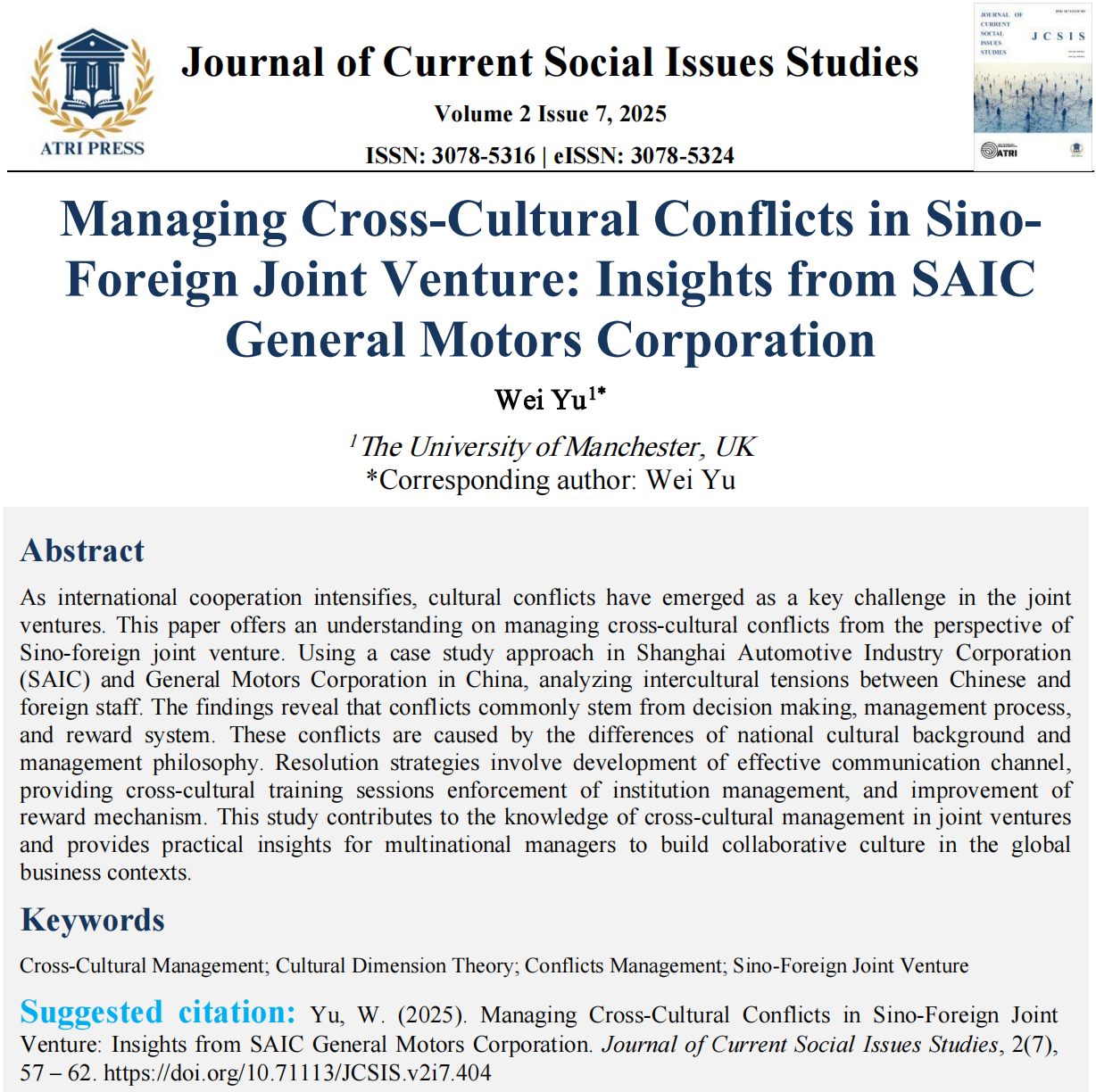Managing Cross-Cultural Conflicts in Sino-Foreign Joint Venture: Insights from SAIC General Motors Corporation
DOI:
https://doi.org/10.71113/JCSIS.v2i7.404Keywords:
Cross-Cultural Management, Cultural Dimension Theory, Conflicts Management, Sino-Foreign Joint VentureAbstract
As international cooperation intensifies, cultural conflicts have emerged as a key challenge in the joint ventures. This paper offers an understanding on managing cross-cultural conflicts from the perspective of Sino-foreign joint venture. Using a case study approach in Shanghai Automotive Industry Corporation (SAIC) and General Motors Corporation in China, analyzing intercultural tensions between Chinese and foreign staff. The findings reveal that conflicts commonly stem from decision making, management process, and reward system. These conflicts are caused by the differences of national cultural background and management philosophy. Effective resolution involves declaration of corporate development goal, enforcement of institution management, and improvement of compensation and reward mechanism. This study contributes to the knowledge of cross-cultural management in joint ventures and provides practical insights for multinational managers to build collaborative culture in the global business contexts.
References
Ferreira, M. P., Li, D., Reis, N. R., & Serra, F. R. (2014). Culture in international business research: A bibliometric study in four top IB journals. Management Research: The Journal of the Iberoamerican Academy of Management, 12(1), 68-91. https://doi.org/10.1108/mrjiam-04-2012-0482
Greblikaite, J. & Daugeliene, R. (2010). The growing need of cross-cultural management and ethics in business. European Integration Studies. 148-152.
Harrigan, K. R. (2017). Joint ventures and global strategies. In P. Buckley (Ed.), International business (pp. 329-338). Routledge.
Hall, E.T. (1989), The Dance of Life: The Other Dimension of Time, Anchor Press.
Hennart, J. & Zeng, M. (2002). Cross-Cultural Differences and Joint Venture Longevity. Journal of International Business Studies, 33(4), 699-716. https://doi.org/10.1057/palgrave.jibs.8491040
Hofstede, G. (1980). Culture's consequences: International differences in work-related values (Vol. 5). Sage.
Hofstede, G. (2011). Dimensionalizing Cultures: The Hofstede Model in Context. Online Readings in Psychology and Culture, 2(1), 8.
Hoon–Halbauer, S. (1999). Managing relationships within sino-foreign joint ventures. Journal of World Business, 34(4), 344-371.
Huang, Q. (2010). On the Difference between Staff in a Sino-Western Joint Venture. Asian Social Science, 6(5).
Jiang, X. (2001). A Case Study of Organisational Culture and Ideological Issues in A Joint Venture in China. Journal of Enterprising Culture, 09(03), 313-330. https://doi.org/10.1142/S0218495801000171
Leonavičienė, E., & Burinskienė, A. (2022). Accelerating cultural dimensions at international companies in the evidence of internationalisation. Sustainability, 14(3), 15-24. https://doi.org/10.3390/su14031524
Lin, G, J. (2015). The Research of Cross-cultural Conflict and Human Resource Management in Sino-foreign JV. Shanghai International Studies University. Shanghai, China.
Lin, X. (2004). Determinations of cultural adaptation in Chinese-U.S. joint ventures. Cross Cultural Management: An International Journal. 11(1), 35-47. https://doi.org/10.1108/13527600410797738
Liu, J., Cui, Z., Feng, Y., Perera, S., & Han, J. (2020). Impact of culture differences on performance of international construction joint ventures: the moderating role of conflict management. Engineering, Construction and Architectural Management, 27(9), 2353-2377. https://doi.org/10.1108/ecam-02-2019-0111
Liu, Y. & Jin, X. (2016). Study on the problems of cross-cultural management in multinational businesses. Management Research. 9(5), 125-126.
Luo, M, Y. (2016). Culture conflict and integration in multinational companies. Corporate Culture. 10(6), 158-159.
Ma, J., Li, C., & Gu, M. (2019). Transnational education in Sino-foreign cooperative universities: Modes, benefits and concerns. International Journal of Information and Education Technology, 9(9), 629-633. https://doi.org/10.18178/ijiet.2019.9.9.1279
Manrai, L. A., Manrai, A. K., Lascu, D., & Friedeborn, S. (2019). Determinants and effects of cultural context: A review, conceptual model, and propositions. Journal of Global Marketing, 32(2), 67-82.
Mayer, C. & Louw, L. (2012). Managing cross-cultural conflict in organizations. International Journal of Cross Cultural Management, 12(1), 3-8. https://doi.org/10.1177/1470595811413104
Nam, K. (2011). Learning through the international joint venture: lessons from the experience of China's automotive sector. Industrial and Corporate Change, 20(3), 855-907.
Ozturgut, O. (2012). China’s Socio-economic Transformation and Sino-U.S. Joint Venture Companies in China. Journal of Organizational Psychology. 12.
Reardon, J., & Miller, C. (2012). The effect of response scale type on cross‐cultural construct measures: An empirical example using Hall's concept of context. International Marketing Review, 29(1), 24-53. https://doi.org/10.1108/02651331211201534
Reis, N. R., Ferreira, M. P., Santos, J. C., & Serra, F. R. (2013). A bibliometric study of the cultural models in international business research. Revista Base (Administração e Contabilidade) da UNISINOS, 10(4), 340-354.
SAIC-GM. (2022). About the company. [online] Available at: https://www.saic-gm.com/www/web/saic-gm/about-company [Accessed 12 Dec. 2022].
Sapuarachchi, D. B. (2021). Cultural distance and inter-organizational knowledge transfer: a case study of a multinational company. Journal of Knowledge Management, 25(9), 2316-2333. https://doi.org/10.1108/JKM-06-2020-0439
Trompenaars, F. (1993), Riding the Waves of Culture: Understanding Diversity in Global Business, Nicholas Brealey International.
Wang, C.L., Lin, X., Chan, A.K., & Shi, Y. (2005). Conflict handling styles in international joint ventures: A cross-cultural and cross-national comparison. Management International Review. 45. 3-21.
Wu, Y. (2014). Study on Cross-cultural Conflict Management in Sino-foreign Joint Ventures in China. Advances in Social Sciences Research, 1(3), 73-85.
Yuan, W. (2010). Conflict management among American and Chinese employees in multinational organizations in China. Cross Cultural Management: An International Journal, 17(3), 299-311. https://doi.org/10.1108/13527601011068388
Zhang, J., Ouyang, Y., Li, H., Ballesteros-Pérez, P., & Skitmore, M. (2020). Simulation analysis of incentives on employees' acceptance of foreign joint venture management practices: a case study. Engineering, Construction and Architectural Management, 27(8), 2047-2078. https://doi.org/10.1108/ECAM-06-2019-0321

Downloads
Published
How to Cite
Issue
Section
License
Copyright (c) 2025 Wei Yu

This work is licensed under a Creative Commons Attribution 4.0 International License.























